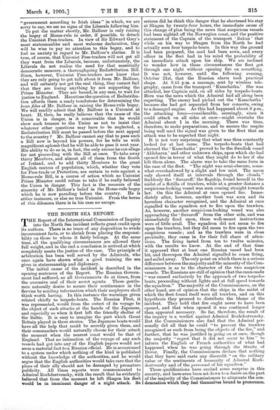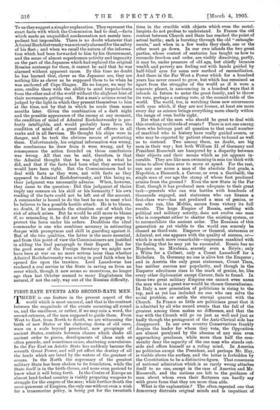T HE Report of the International Commission of Inquiry into the
North Sea incident reflects great credit upon its authors. There is no trace of any disposition to evade inconvenient facts, or to shrink from placing the responsi- bility on those to whom it fairly belongs. At the same time, all the qualifying circumstances are allowed their full weight, and in the end. a conclusion is arrived at which completely meets the justice of the case. The principle of arbitration has been well served by the Admirals, who once again have shown what a good training the sea gives in statesmanship and diplomacy. The initial cause of the incident is described in the opening sentences of the Report. The Russian Govern- ment had suffered, as all Governments do at times, from the excessive zeal of their secret agents. These gentle- men naturally desire to secure their continuance in the Service by sending information which their employers shall think worth having. In this instance the warnings given related chiefly to torpedo-boats. The Russian Fleet, it was represented, would from the outset of its voyage be the object of such attacks at the hands of the Japanese, and especially so when it first left the friendly shelter of the Baltic. It is easy to imagine the part which Great Britain played in these stories. The Japanese boats would have all the help that could be secretly given them, and their commanders would naturally choose for their attack the moment when the nearest coast would be that of England. That no intimation of the voyage of any such vessels had got into any of the English papers would not seem a material fact to a Russian official. He is accustomed to a system under which nothing of the kind is published without the knowledge of the authorities, and he would argue that the English authorities would take care that the plans of their ally should not be deranged by premature publicity. All these reports were communicated to Admiral Rozhdestvensky, with the result that he evidently believed that from the moment he left Skagen his fleet would be in imminent danger of a night attack. SO serious did he think this danger that he shortened his stay at Skagen by twenty-four hours, the immediate cause of this change of plan being the news that suspicious vessels had been sighted off the Norwegian coast, and the positive statement of the Captain of the transport Ba,kan ' that while on his way to Skagen from the North he had actually seen four torpedo-boats. In this way the ground had been prepared, the seed had been sown, and every officer in the fleet had in his mind the probability of an immediate attack upon his ship. We are inclined to wonder how in these circumstances the fleet got through one night without opening fire on something. It was not, however, until the following evening, October 21st, that the Russian alarm took practical shape. At 8.45 p.m. a message, sent by wireless tele- graphy, came from the transport Kamchatka.' She was attacked, her Captain said, on all sides by torpedo-boats. Here was the news which the Admiral had all along been expecting. The enemy had picked out the 'Kamchatka' because she had got separated from her consorts, owing to a damaged engine. As this had happened about 8 p.m., the attacking force—considerable, seemingly, since it could attack on all sides at once—might overtake the Admiral about I in the morning. There was time, therefore, to make preparations, and to ensure the respite being well used the signal was given to the fleet that an attack was to be expected that night.
It is not very surprising that what was thus constantly looked for at last came. The torpedo-boats that had alarmed the 'Kamchatka' proved to be the Swedish vessel Aldebaran ' and other unknown ships, upon which she had opened fire in terror of what they might do to her if she left them alone. The alarm was to take the same form in the case of the fleet. "The night was semi-obscure, some- what overshadowed by a slight and low mist. The moon only showed itself at intervals through the clouds." Suddenly the Suvaroff,' the flagship, found herself in the midst of a flotilla of trawlers, while at a greater distance a suspicious-looking vessel was seen coming straight towards her. On this the Admiral at once opened fire. Imme- diately after, however, another boat was seen and its harmless character recognised, and the Admiral at once signalled to the squadron not to fire upon the trawlers. As, however, another suspicious-looking vessel was also approaching the Suvaroff ' from the other side, and was immediately fired upon, these well-meant instructions were of little avail. The squadron did not mean to fire upon the trawlers, but they did mean to fire upon the two suspicious vessels ; and as the trawlers were in close proximity, they came in for their full share of atten- tions. The firing lasted from ten to twelve minutes, with the results we know. At the end of that time it appeared that at least one Russian vessel had been hit, and thereupon the Admiral signalled to cease firing, and sailed away. The only point on which there is a serious difference between the majority and the minority of the Com- missioners is as to the character of the two suspicious vessels. The Russians are still of opinion that the cannonade "was caused exclusively by the approach of two torpedo- boats, proceeding without lights and at full speed towards the squadron:" The majority of the Commissioners, on the other hand, are of opinion that the ships in the midst of which the fleet found itself were all trawlers, and on this hypothesis they proceed to distribute the blame of the incident. They hold that fire ought never to have been opened, and that when opened it was continued longer than appeared necessary. So far, therefore, the result of the inquiry is a verdict against Admiral Rozhdestvensky. But the Commissioners also find that the Admiral per- sonally did all that he could "to prevent the trawlers recognised as such from being the objects of the fire," and further, that he was justified in going on at once, though the majority "regret that it did not occur to him" to inform the English or French authorities of what had happened when he was going through the Straits of Dover. Finally, the Commissioners declare that nothing that they have said casts any discredit "on the military value or the sentiments of humanity of Admiral Rozh- destvensky and of the personnel of his squadron." These qualifications have excited some surprise in this country, and have even been set down to a desire on the part of the majority of the Commissioners to attenuate the con- demnation which they feel themselves bound to pronounce. To us they suggest a simpler explanation. They represent the exact facts with which the Commission had to deal,—facts which made an unqualified condemnation not merely inex- pedient but impossible. There is no doubt whatever that Admiral Rozhdestvensky was seriously alarmed for the safety of his fleet ; and when we recall the nature of the informa- tion which had been forwarded to him by his Government, and the sense of almost superhuman activity and ingenuity on the part of the Japanese which had replaced the original Russian contempt for them, it cannot be said that he was alarmed without apparent cause. By this time no doubt he has learned that, clever as the Japanese are, they are nothing like as clever as he supposed them to be when he was anchored off Cape Skagen. He no longer, we may be sure, credits them with the ability to send torpedo-boats from the other end of the world without the slightest hint of their movements getting out. But a man's actions must be judged by the light in which they present themselves to him at the time, not by that in which he reads them some 'months later. Given the combination of a dark night and the possible appearance of the enemy at any moment, the condition of mind of Admiral Rozhdestvensky is per- fectly intelligible, and would probably have been the condition of mind of a great number of officers in all ranks and in all Services. He thought his ships were in danger, and he took the obvious means of protecting them. Unfortunately, his original information was wrong, the conclusions he drew from it were wrong, and by consequence the action founded on those conclusions was wrong. All that can be said, therefore, is that the Admiral thought that he was right in what he did, and that if the facts had been what they seemed he would have been right. But the Commissioners had to deal with facts as they were, not with facts as they appeared to Admiral Rozhdestvensky, and this being so, • their judgment was necessarily adverse. When, however, they came to the question : Did this judgment of theirs imply any censure on his skill or his humanity ? his own reading of the facts could not be left out of the account. A commander is bound to do the best he can to meet what he believes to be a possible hostile attack. He is to blame, no doubt, if he misreads the situation out of which the risk of attack arises. Bat he would be still more to blame if, so misreading it, he did not take the proper steps to protect 'the force under his orders. Doubtless the ideal commander is one who combines accuracy in estimating danger with promptness and skill in guarding against it. But of the two qualities, the latter is the more essential, and from this point of view the Commissioners are justified in adding the final paragraph to their Report. But for the good sense of the Foreign Secretary we might now have been at war on no more serious issue than whether Admiral Rozhdestvensky was acting in good faith when he opened fire upon the trawlers. Lord. Lansdowne has rendered a real service to the State in saving us from an error which, though it now seems so monstrous, no longer ago than last October seemed to many Englishmen the natural, if not the only, way out of the Russian difficulty.











































 Previous page
Previous page